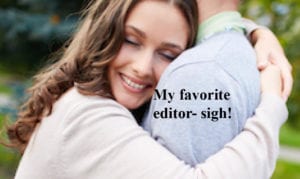When we are new to writing, and are in the process of preparing to find a publisher, or publish our own book, each of us has some unique challenges.
Let’s assume we have done much in the way of the basics. We have taken courses, we understand how important the premise, the antagonists and the protagonist are, and we’re proud we’ve got a basic story outline prepared. We feel we have a viable novel, with interesting characters, and so we are ready to write.
Thus begins the first ten percent of the growth of our novel. Ten Percent? Who said that? What does it mean? I’ve written 400 pages and you call that ten percent?
It’s true. Our first draft is just ten percent of the job. The real work begins with the editing. This means the editing that occurs even before we send it for the final professional edit.
Whether you travel the agent/publisher route, or simply self-publish, the same amount of editing/work is required.
A publisher invests a great deal of money in each book they launch into the market. They spend thousands of dollars on the interior design/formatting of your book, for both print and digital versions. Then there is cost of the cover, including artwork, photography, the specific design, and the person who brings this all together to create a selling cover. Add to that figure, bookmarks, book trailers, press releases, book fairsand some basic internetmarketing.
What you may not realise is that these are exactly the same things on which you will have to spend money, when you self publish.
I hope this emphasizes the importance of having a manuscript that is well written, well edited, and as free from mistakes as possible, before you submit to your publisher, or before you self publish.
Let’s assume you have that fine premise, those well rounded characters, an exciting and entertaining plot, and a book that flows well.
Where many new authors trip up, is assuming that this is sufficient. It’s not. A publisher will be looking for well-crafted work before they are ready to plunk down big up-front expenses.
If you are self publishing, and you don’t prepare your book to the same standard as a publisher expects, you may get initial sales. However, will you get recommendations and good reviews so that others will be motivated to purchase your book?
What are these things that trip us up? Glad you asked. The ‘uh-oh’ signs of an inexperienced writer are:
- sloppy puntuaction — using too many or too few commas, exclamation points by the score, and a boatload of elipsis andm-dashes,
- too many font changes and an overload ofitalics,
- misspelled words,
- poor grammar in the narrative (It is OK to use poor grammar in dialogue if this is indicative of someone’scharacter),
- dialogue that is too formal (unless it is also part of charactertrait),
- too much telling, and not enough
- the use of too many inactiveverbs,
- a plethora of dialogue tags, and the addition of the dreaded ‘Tom Swifties,’ For those too young to remember Tom Swifties, an example would be: “Hurry up,” Tom said swiftly, or “I hate you,” Tom said angrily,
The simpler and cleaner your book, the more likely the reader will become involved, enjoy it, and recommend it to others.
I know that if people buy my book, are happy with the reading of it, and recommend it to others, my first ten percent, and my labor-intensive ninety percent are absolutely worth it.
And your professional Editor… worth even more




